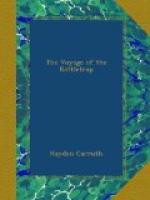So we went on, and a little after dark wound down among the black baked bluffs to the crossing, without any of us having had a drop to drink since before sunrise. After we had “lowered the river six inches,” as Jack declared, we went into camp.
We were up early in the morning, and Jack went down the river with his gun and got a brace of grouse. There was one house near the crossing, which was the post-office. The man who lived there told us it was a hundred and twenty-five miles across the Reservation to Pierre, and twenty miles to Peno Hill, the first station at which we should find any one. The ford was deep, the water coming up to the wagon-box, and there was ice along the edges of the river. It was a fine clear day, however, and the cold did not trouble us much. We wound up among the bluffs on the other side of the river, and at the top had our last sight of the Black Hills. We went on across the rolling prairie, black as ink, as .the grass had all been burned off, and reached Peno Hill at a little after noon. There was a rough board building, one end of it a house and the other a barn. All of the stage stations were built after this plan. We camped here for dinner, and pressed on to reach Grizzly Shaw’s for the night. About the middle of the afternoon we passed Bad River Station, kept by one Mexican Ed.
“I’m going to watch and see if he runs when he sees Snoozer,” said Ollie. Snoozer had insisted on walking most of the time since his adventure with the horse-thieves; but, greatly to Ollie’s disappointment, Mexican Ed showed no signs of fear even when Snoozer went so far as to growl at him.
As it grew dark we passed among the Grindstone Buttes—several small hills. A prairie fire was burning among them, and lit up the road for us. We came to Shaw’s at last, and went into camp. We visited the house before we went to bed, and found that Shaw was grizzly enough to justify his name, and that he had a family consisting of a wife and daughter and two grandchildren.
“Pierre is our post-office,” said Shaw, “eighty-five miles away.”
“The postman doesn’t bring out your letters, then?” returned Jack.
“We ain’t much troubled with postmen, nor policemen, nor hand-organ men, nor no such things,” answered Shaw. “Still, once in a while a sheriff goes by looking for somebody.”
We told him of our experience with thieves, and he said:
“It’s a wonder they didn’t get your pony. There’s lots of ’em hanging about the edge of the Reserve, because it’s a good place for ’em to hide.”
“Must make a very pleasant little walk down to the post-office when you want to mail a letter,” said Jack, after we got back to the wagon—“eighty-five miles. And think of getting there, and finding that you had left the letter on the hall table, and having to go back!”
We were off again the next morning, as usual. At noon we stopped at Mitchell Creek, where we found another family, including a little girl five or six years old, who carried her doll in a shawl on her back, as she had seen the Indian women carry their babies. We had intended to reach Plum Creek for the night, but got on slower than we expected, owing partly to a strong head-wind, so darkness overtook us at Frozen Man’s Creek.




